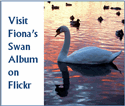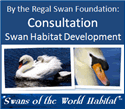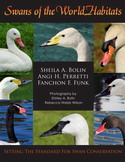Ask the Swan Specialist
Date: 21 November 2015
Hi Annie:
There are several reasons for the trampling. If there are turtles or other aquatic creatures in the area, the swans do not want to stick their heads under the water, especially if there are snapping/soft shelled turtles which can seriously injure or even kill them.
Trampling can also dig up vegetation and plankton. Plankton is a secondary food resource, so the major intent is to stir up some of the aquatic vegetation. This is especially helpful for baby swans which do not have long necks to reach the food source. This stirring of the aquatic vegetation can also benefit other waterfowl such as dabbling ducks.
There are also several reasons for your seeing more cygnets (babies) in your pond versus possibly other wild families/flocks.
If your pond is a safe habitat and/or people are feeding the swans, then this is a great area to increase the population. Swans and other waterfowl will not exponentially increase their population to overrun the capacity of the habitat. Simply meaning, if food, shelter and habitat resources are not available and it is not a safe habitat, swan parents will not have that many offspring. Conversely, if food, shelter and safety availability are primary components of a habitat, the more success in raising and keeping the offspring.
Infection and injuries also occur which can cause attrition and these have to be taken into consideration.
Besides predation, illness and injuries, there are also two other possible reasons for low family numbers.
One is that in some areas, wildlife officials do not like Mute Swans and intentionally kill them or addle/prick their eggs so they do not produce as many or any cygnets.
Another reason is that female swans, usually all female birds, are programmed to have an exact number of eggs for her lifetime. The lifetime number is then divided into the number that she will lay during each breeding season, regardless if they are viable. So, if a swan is programmed for three eggs, she will lay three eggs and if the nest is disturbed, i.e., someone or something removes an egg, she will try to replace it. This double clutching on the part of the female can be detrimental to her health as she loses approximately 30% of her weight during the laying/incubation process. So, double clutching is not something that is desirable for her health. The Regal Swan
Messages In This Thread
- Swan Behavior -- Annie -- 21 November 2015
- Re: Swan Behavior -- The Regal Swan -- 21 November 2015
- Re: Swan Behavior -- Annie -- 25 November 2015
- Re: Swan Behavior -- The Regal Swan -- 27 November 2015
- Re: Swan Behavior -- Annie -- 25 November 2015
- Re: Swan Behavior -- The Regal Swan -- 21 November 2015
Ask the Swan Specialist is powered by
Tetra-WebBBS 5.30 Beta © 2006-2007 Tetra-Team






